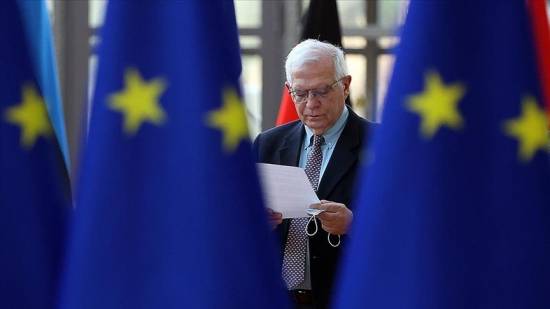EU foreign ministers discussed further financial sanctions on Russia and the necessity to speed up energy transition, EU foreign policy chief Josep Borrell said on Friday.
EU foreign ministers held an extraordinary meeting in Brussels with the NATO chief and top diplomats from Ukraine, the US, the UK, and Canada to discuss their response to the Russia-Ukraine war.
Speaking at a news conference following the reunion, Borrell confirmed that ministers assessed a new sanctions package that aims to “deepen the financial sanctions” and targets more Russian banks with restrictive measures.
Borrell said the new package should be adopted in the next few days, and stressed that the EU will continue to impose sanctions on Russia until it stops "the military aggression against Ukraine."
He also warned that the bloc has to make sure that the already adopted measures are enforced.
Borrell said that in order to “undermine the Russian war machine”, “it is not enough to announce to agree and to announce, but sanctions have to be implemented, loopholes have to be closed.”
“We have to avoid Russian oligarchs to escape from the ethics of sanctions and to clamp down on tax evasion,” he added, pointing out that European authorities have to locate Russian oligarchs “to seize their assets because the Russian regime dwells on their wealth from corruption and tax evasion.”
Borrell explained that the foreign ministers also discussed the bloc’s energy transition that “needs to be speeded up not just for climatic reasons, but also for geopolitical reasons.”
At the same time, he acknowledged that the EU cannot cut Russian energy dependency “overnight” since the EU imports over 40% of its total consumption from Russia.
Since Russia's war on Ukraine began on Feb. 24, it has been met by outrage from the international community, with the EU, UK, and US implementing a range of economic sanctions on Russia.
The EU adopted so far three sanctions packages against Russia, targeting among others President Putin, top diplomat Sergey Lavrov, the Russian banking sector, and key state-owned companies.
According to UN figures, 331 civilians have been killed and 675 injured in Ukraine since the start of the war. Ukrainian authorities, however, put the death toll at over 2,000./aa


